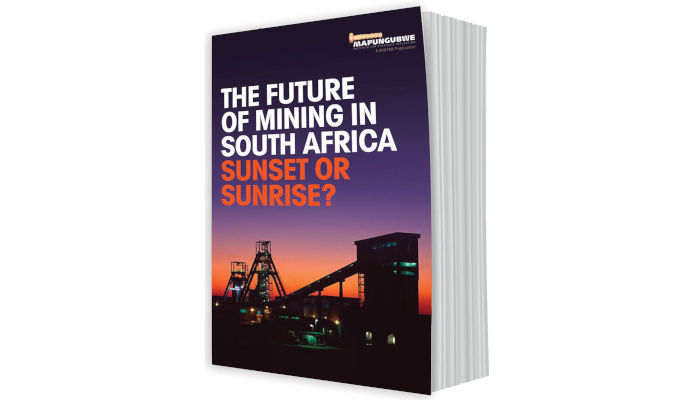New book alert! The Future of Mining in South Africa: Sunset or Sunrise?

The Future of Mining in South Africa: Sunset or Sunrise? comes at a time of debates around the Mining Charter.
It is the hope of the authors that the issues raised in this volume will encourage broader discussion on the role of mining in a South Africa that is striving to improve its growth and development and even serve as a catalyst for change.
The book covers issues like the potential of platinum to spur industrialisation, land and dispossession on the platinum belt, the roles of the state and capital in mineral development, mining in the era of the Fourth Industrial Revolution, a historical survey of women and mining from the late 19th century to present and mine worker organising: history and lessons and how post-mine rehabilitation can be tackled.
It was inspired not only by an appreciation of our country’s extensive mineral endowments, but also by a realisation that, while the South African mining industry performs relatively well on many technical indicators, its management of broader social issues leaves much to be desired. It needs to be deliberated whether the mining industry can play as critical a role going forward as it did in the evolution of our economy.
This book has an international appeal as it shows what the future of mining is for all mineral-rich countries given the current global moment of climate change, cumulative environmental damage caused by mining and an industry dominated by transnational corporations. The book offers key questions and a methodology to investigate them, which can be applied to/by any country.
List of contributors
Crispen Chinguno is Senior Lecturer (Sociology) at Sol Plaatje University.
Duma Gqubule is the founder and director of the Centre for Economic Development and Transformation (CEDT).
Edwin Ritchken is the coordinator of the Mining Phakisa, an industry-wide collaborative initiative between government, the mining industry, labour and other stakeholders, to galvanise growth and technology development in the mining sector.
Hameda Deedat is Acting Executive Director at Naledi, the research arm of the Congress of South African Trade Unions (COSATU).
Hibist Kassa is an Executive Committee member of Development Alternatives with Women in a New Era (DAWN).
Joel Netshitenzhe is Executive Director and Vice-Chairperson of the Board of Governors of MISTRA.
Khwezi Mabasa is a researcher in the Faculty of Political Economy at MISTRA.
Lorenzo Fioramonti is Professor of Political Economy at the University of Pretoria.
Nester Ndebele is the chair of Women Affected by Mining United in Action (WAMUA).
Ross Harvey leads the extractive industries research work of the ‘Governance of Africa’s Resources Programme’ at the South African Institute of International Affairs (SAIIA).
Salimah Valiani is Senior Researcher, Faculty of Political Economy, at MISTRA.
Shingirirai Mutanga is a senior research specialist under the Science and Technology programme of the Africa Institute of South Africa, a division of the Human Science Research Council (HSRC).
Sonwabile Mnwana is Associate Professor and Head of Department of Sociology at the University of Fort Hare, East London.
About MISTRA
The Mapungubwe Institute for Strategic Reflection (MISTRA) is an independent research institute that takes a longterm view on the strategic challenges facing South Africa.
MISTRA was founded by a group of South Africans with experience in research, academia, policy-making and governance who saw the need to create a platform of engagement around strategic issues facing South Africa. It is an institute that combines research and academic development, strategic reflection and intellectual discourse. It applies itself to issues such as economics, sociology, history, arts and culture and the logics of natural sciences.
For more, visit www.mistra.org.za.
Categories Non-fiction South Africa
Tags Jacana Media New books New releases The Future of Mining in South Africa
